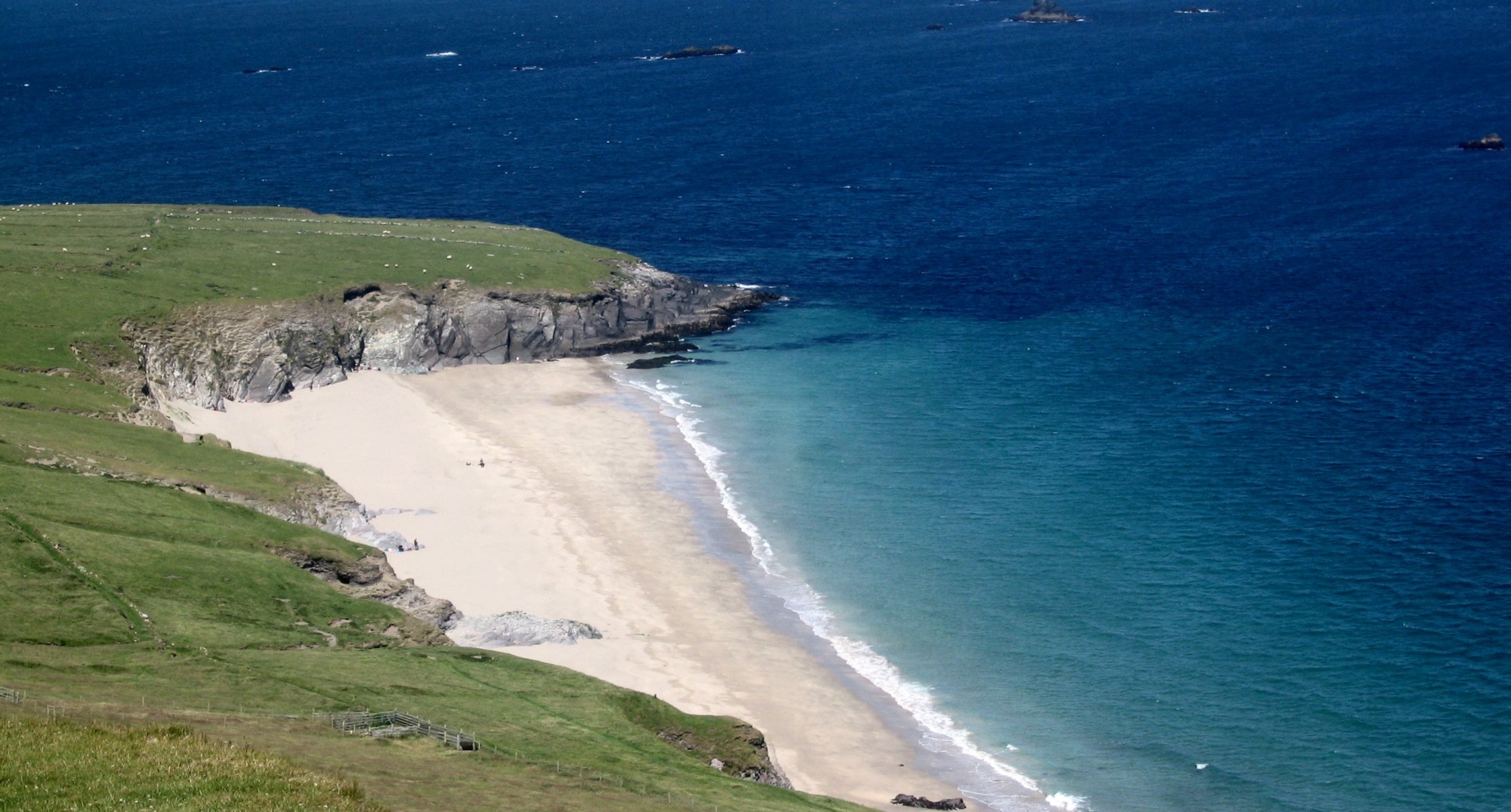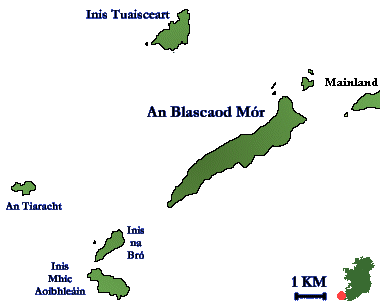
Blaskets - Blascaodaí - Origin Uncertain; possibly Viking - brascar, a sharp reef
An Blascaod Mór - The Great Blasket
Inis Tuaisceart - Inishtooskert - North Island
Inis na Bró - Inishnabro - Island of the Quernstone
Inis Mhic Aoibhleán or Inis Icileáin - Inishvickillane - Origin very uncertain
An Tiaracht - Inish Tearaght - The Most Westerly (island)
Listing of books and articleson the Blaskets
An t-Oileánach - Tomás Ó Criomhthain - 1929
The Blasket Island Guide - Ray Stagles and Sue Redican - 2011 - O'Brien Press
Blaskets - People and Literature, Muiris McConghail, 1987, Country House
Blasket Islands - Next Parish America - Joan and Ray Stagles - O'Brien Press
On an Irish Island
Robert Kanigal - Knopf, 2012
Way of Life
NPWS
The Blasket Centre - English | Ionad an Bhlascaoid Mhóir - Gaeilge
Seabirds
The Blasket islands are a Special Protection Area (SPA) under the E.U. Birds Directive, For Storm Petrel, the site is the most important in the world and for Manx Shearwater it is the most important in Ireland. Leach's Petrel has bred and may still breed. Further breeding species typical of western islands include Oystercatcher, Rock Dove, Wheatear, Raven and, possibly, Twite. The Blaskets formerly had wintering populations of Greenland White-fronted Goose and Barnacle Goose.| Bird | Number | |
| Storm Petrel - More | 52,141 pairs | |
| Manx Shearwater | 20,534 pairs | |
| Fulmar | 2,000+ pairs | |
| Puffin - More | 5,000 individuals | |
| Guillemot | 470+ individuals | |
| Black Guillemot | 44+ individuals | |
| Razorbill | 350 pairs | |
| Lesser Black-backed Gull | 536 pairs | |
| Great Black-backed Gull | 123 pairs | |
| Kittiwake | 700 pairs | |
| Herring Gull | 99 pairs | |
| Arctic Tern | 100 - 200 pairs | |
| Shag | 60 pairs | |
| Chough | 13 pairs | |
| Source: NPWS website. These numbers indicate the presence of and population size of breeding birds. | ||
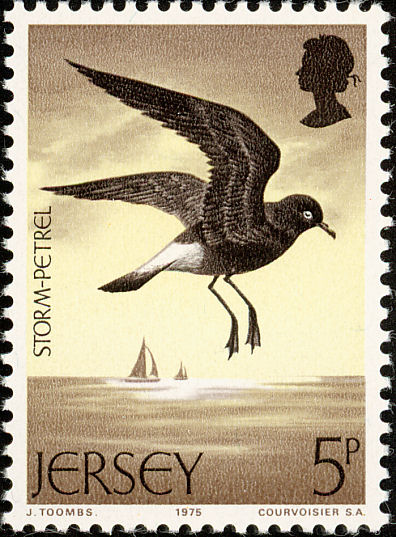
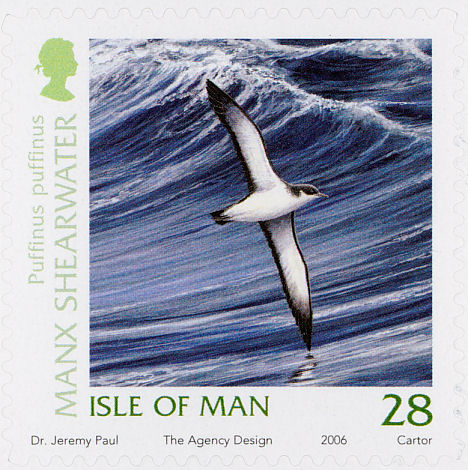
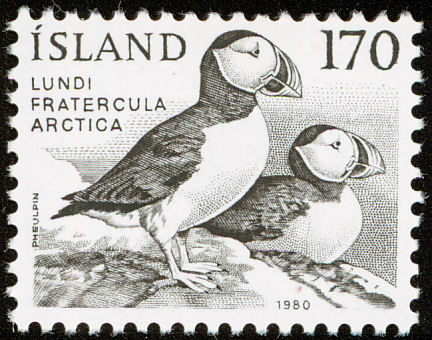
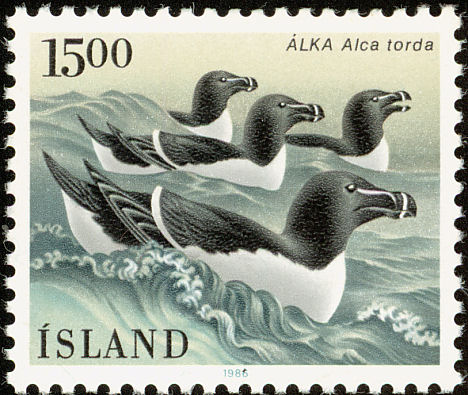
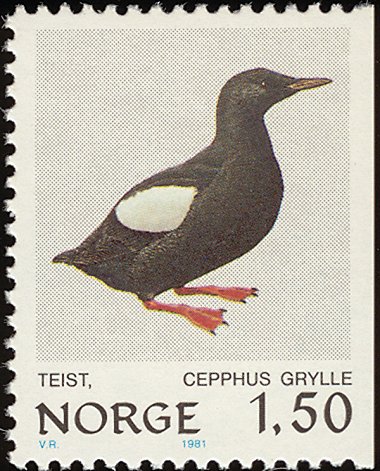
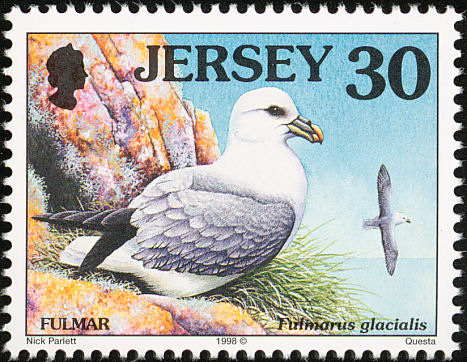
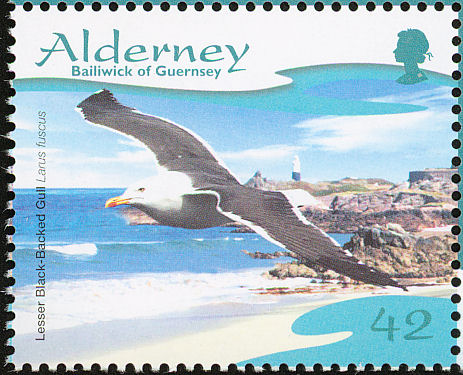
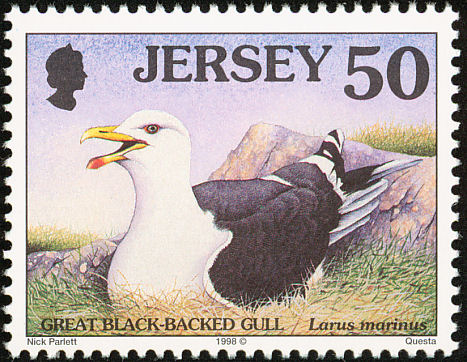
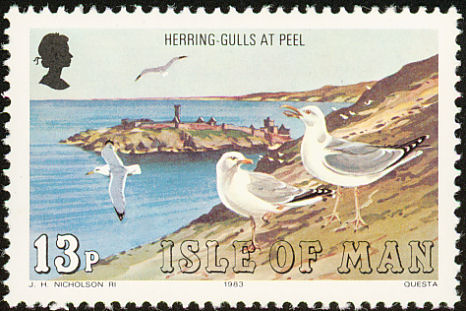
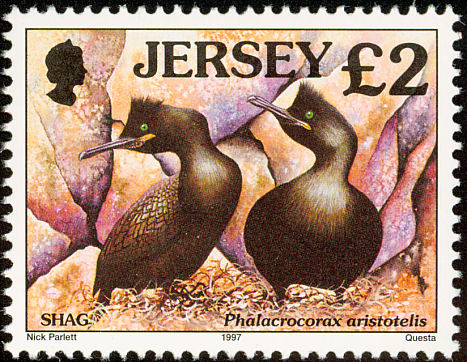
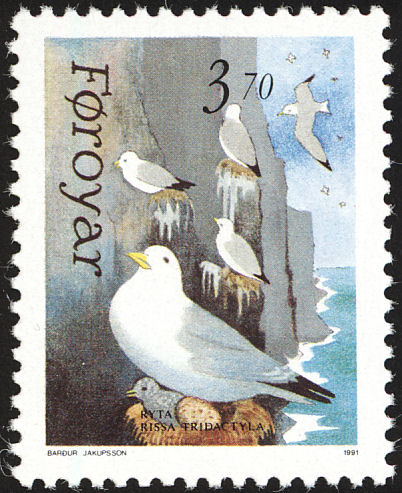
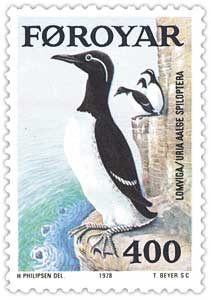
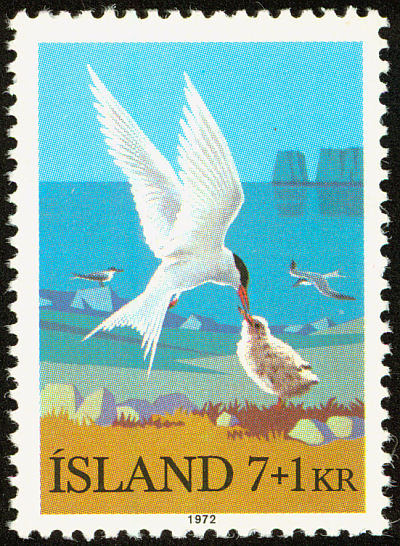
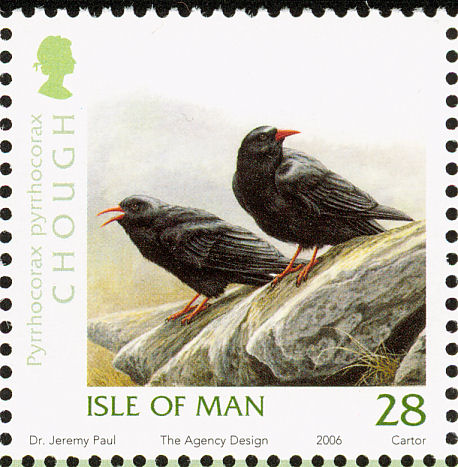

An tOileánach
Declan Kiberdwrites on An tOileánach in his book Irish Classics
Published by Granta Books - 2000
T he tiny islands off the west coast of Ireland fascinated writers and artists. For some, like W.B Yeats, they epitomized pride, solitude and a sense of estrangement. For others, such as J.M. Synge, they provided the example of a commune in which life was reduced to its fundamentals - mankind pitted against nature.
There is stoic quality to much island philosophy: a sense that there is no point in grieving excessively for those who have died because such grief can never feed the living., Ní chothaíonn an té a imíonn an té a fhanann . Intense sorrow is understandable, of course, but if taken too far it may be seen as a form of hubris, a sin against toil Dé (the will of God). As such it would become a sentimental investment of earthly things with more significance than the eternal powers would give to them.
The centuries old life of the Blasket islands was already clearly doomed to pass away when Tomás Ó Criomhthain published An Oileánach (The Islandman) in 1929. In that text a deep humility before his people's tradition is accompanied by an invincible pride, and both characteristics shine through the pages.
The islanders are scarcely part of the literate world yet they :speak a kind of elegant poetry. They live in a sort of socialist commune yet they bear themelves with the beautiful reserve and considered manners of real aristocrats. They are the ultimate in radical traditionalism. The "king'' of the Blaskets is always elected.
Ó Criomhthain had learned how to read and write English at the island school in the 1860s. However, like almost all Gaeltacht people of the time, he remained illiterate in Irish. He only began to learn how to read and write Irish when he was convinced by visiting scholars - whom he was chosen by the king of the island to instruct in Irish - that a book of his experiences would be a thing of value to the world. By then, he was over 40.
The king had reasoned well for he sensed that Ó Criomhthain's rich oral Irish could never be constricted or corrupted by the written protocols of the language. Its bases were too securely laid by then.
Ó Criomhthain, though possessing a wide vocabulary, was always restrained and exact in his choice of words. His first student was a linguist named Carl Marstrander, a polevault champion of Norway who demonstrated his skill to the islanders (Who had never heard of that sport before) by using the oar of a naomhög (coracle) to launch himself over Ó Criomhthain's house.
An tOileánach begins in the 1860s and ends in the 1920's. The world it evokes is almost medieval. The contrast between the material poverty of the islanders and the verbal richness of their tales could not have been greater. Even their conversation - the chief entertainment on the Blaskets: - was treated as an art form.
Most of the tales learned by Ó Criomhthain had been given oral narration for centuries before they were written down, They resembled those of' Homer in their concrete, terse and understated idiom that always seemed to tremble on the brink of poetry. The early pages, of the autobiography present not just the:writer's childhood memories, but the very way in which he: recollected them - random, associative, even a little haphazard.
The people are caught between the moods of romantic love and the harsh necessities of subsistentce farming - and Ó Criomhthain becomes a victim of their irreconcilability.
On a visit to Inis Icealáin with his uncle, Diarmuid, he is supposed to be hunting rabbits but has gone there in reality to court a local woman with whom he is deeply in love. He walks out from a party with her into the stillness of the night. For that he is gently teased by the uncle (who is, none the less a great advocate of the match) but the writer's family have other ideas. It is more practical for him to marry a woman from his own place, whose people might be of help in time of difficulty.
So Tomás marries the local woman, much against his own inclinations. At the wedding feast this man (who usually never stopped singing) offers the company just one song. It breaks register with the occasion since it tells of a girl's hopeless love:
Go bhfuil mo ghrâ bán dom thréigean, as a Dhia Ghléigil as a Mhuire nach dubhach?
(That my fair-headed love.is abandoning me, and O bright God and Mary, isn't that bleak?)
There is no real description of the development of the marriage: perhaps that the author's quiet protest at the system of made matches. Instead, he loses children to the cliffs, the whooping cough, the sea and even to America. These deprivations are chronicled in rapid succession in a simple but amazing style.
Do saoluigheadh deichniúr clainne dhúinn ach níor lean an rath iad san, go bhfhóiridh Dia orainn. An chéad duine riamh a baisteadh liom bhí sé a seacht nó a hocht de bhlianaibh nuair a thuit sé le faill agus marbhuigheadh é. As san amach níor thapúla duine orainn ná dinn. D'imigh beirt leis an mbruitínigh agus ní raibh galar d'á dtagadh ná beireadh duine éigin uaim. Bádh Domhnaill d'iarraidh an bhean-uasail a thabhairt slán leis as an dTráigh Bhán Do bhí buachaill breagh eile agam, ag tarrac chugam. Ní ró-fhada a bhí an t-am gur tógadh uaim é.
Do ghoill beirt buairt na nithe sin go léir ar an máthair bhoicht agus tógadh uaim í. Ní rabhas dall ar fad go dtí san. Nár dallaidh Dia sinn. Bhí naoidhneán beag i n-a dhiaidh - ach go raibh cailín beag fásta suas a thug aire di - ní raibh sí ach fásta suas san am gur glaodhadh uirthi chomh maith leo. An cailín a thóg í sin do phós sí sa Dhún Mór. Cailleadh í sin, leis, agus d'fhág seisear leanbh i n-a diaidh. Buachailll amháin atá fanta faram annso sa bhaile. Buachaill eile i Meirice. Sin é crích d'imigh ar mo chlainnse. Beannacth Dé leo - a bhfuil san uaigh aca - agus leis an mnaoi bhoicht gur bhris a misneach d'á ndeascaibh.
(Ten were born to us and they were not followed by any luck, may God protect us. The first of mine to be baptised was seven or eight years old when he fell down a cliff and was killed. After that we no sooner had one than we lost one. Two died of the whooping cough and there was no illness to come that didn't take someone from me. Donal was drowned attempting to save the life of a lady off the White Strand. I had another fine boy assisting me. It was not too long before he was taken from me.
The sorrow of all those things oppressed the poor mother and she was taken from me. I wasn't blind completely until then. May God never blind us There was a little infant left after her - only that there was a grown girl to take care of her - but she was only grown herself at the time that she was called away as wall. The girl who reared her married in Dunmore. She also died and left six children after her One boy only is left here at home. Another boy is in America. That is the end that came to my own family. The blessing of God with them - those who are in the grave - and with the poor woman whose courage.broke for their sake).
T he choice of words is as careful and deliberated as ever, Nóra Ní Chatháin is remembered not as "mo bhean chéile" (my wife), but "an mathair bocht" (the poor mother): and the rejection of the possessive in favour of the article speaks volumes. So does. the characterisation of the woman as a mother rather than a wife.
The women of the island, perhaps as a result of the made matches, seem more interested in their children than their husbands. This was exactly the situation that Synge found on tha Aran islands, where the sexual instincts, though strong, were subordinated to the demands of the family life, and where the maternal feeling because it was so powerful, gave a life of torture to many women who reared their children only to lose them later to the sea or to the emigrant ship. The quite understatement of the whole passage implies a great deal that is clearly being left unsaid. This is a stunning instance of that necessary separation which T.S. Eliot praised in all stoic literature beween the man who suffers and the mind which creates.
In Synge's Riders to the Sea the closing line of Old Maurya, who has lost all her men to the: ocean have the same gravely reticent dignity:
"I've had a husband, and a husband's father, and six sons in this house . . and some of them were found and some of them were not found, but they're gone now the lot of them . . ."
There is however, one fundamental difference between the handling of the material. Synge's speech is placed at the climactic and conclusive moment: of a taut one act play, wheras Ó Criomhthain offers this rapid flash-forward in a central chapter of his book removing in a single gesture most of the suspense and uncertainty from later chapters.
Why did be do this? One explanation might be found in his desire to enforce a note of fatalism in the second half of the book, as if its characters (rather like the Aran fishermen who so moved Synge) are felt to be living under sentence of death.
A more practical reason might be found in Ó Criomhthain's determination to divide up his narrative into separate thematic units, taken chapter by chapter.This is the chapter that deals with family tragedy: others deal with such matters as houses, work, games and pastimes, marriage and so on. The effect is to make An tOileánach appear, at least in its structure to be a little like an anthropological textbook albeit one written for an audience of secondary school children. Whatever the reason for this telescoping of a whole plethora of tragedies into two quiet paragraphs, the style of writing is of a piece with the mood of acceptance that informs the other chapters.
There is little analysis of motive or psychology in An tOileánach: things just happen as if under geasa in some hero-tale, and the better part of wisdom is lo live as gracefully as one can with an imperfect world rather than submit to the inexcusable vantiy of seeking to challenge fate.
The separation in Ó C.riomhthain's sensibility between the person who suffered and the mind which created seems to have been shared generally by the islanders. They were perfectly capable of praising a witty, astringent line even when they were the target of its attack. Speaking to a mlddleaged woman named Síle, as she works in her kitchen on some fine-flavoured potatoes, Tomás says:
Ó tá do bhláth féin sleamhnaithe uait, nach mór an ní dhuit é a bhfeith ar do phrátaí?
(Sin your bloom has slid from you, isn't it a great thing that it's on your potatoes?)
- and the woman is delighted by the imaginative, audacious beauty of the conceit, (Marcel Proust, who said that men should leave the love of beautiful women to men without imagination, would have approved).
Ó Criomhtkain has a similar capacity to detach himself suddenly from the flow of a felt experience in order to submit it to cool artistic appraisal, even as he narrates it. His humour is sceptical and implies a recognition that it is wise to reserve all final judgements. As a consequence he he is sought out in the role of confidant by neighbours, who are keen to have the good opinion of a man known for his considered assessments. A wry, ironical cast of mind permits Ó Criomhthain to keep a sense of perspective in a life that might otherwise overwhelm; "There is always a narrow margin between these men and violent death'' wrote Robm Flower in the foreword to his fine translation of An tOileánach , "and their faculties are keener for that."
The same point had already been made by Synge about the perils of a life that made it "imposslble for clumsy foolhardy or timid men to live on these islands''. The communities values endorsed by Synge at the start of the 20th century were rediscovered in the Blaskets for the next generation by Flower:: "such a life, without shops or specialist craftsmen develops an all-round competence, a total physical and mental alertness".
If the islanders were inadvertent poets, as they were also instinctual anarchists. Synge was impressed by the versatility of a generally bilingual people who knew no division of labour, their work changing with the seasons from fishing to burning kelp, from cuttmg shoes to thatching houses, from building cradles to making coffins, in a way that kept them from the dullness and monotony of industrial life.
The young women of the Blasket, who knocked Ó Criomhthain over onto the long grass for horseplay, were in their manners very like the candid, free-spirited women of Inis Meáin, who had never (in Synge's view) submitted to the "moral bondage" of "ladylike persons''. The shared risks and pleasures of that life were so rudimentary and so essential that it came as a terrible shock for Ó Criomhthain to visit the mainland town of Dingle and there on the quayside to discover a social system characterised by the ugly injuries of class feeling:
Chonac daoine uaisle ina seasamh ann agus slabhraí timpeall a mbuilg, daoine bochta agus gan a leath-cheart d'éadach orthu.
(I saw gentlefolk standing htere, with decorative chains around their waists, and poor people without their sufficiency of clothing).
The islanders were egalitarians, but the mainland had been anglicised and overtaken by class snobberies. It was hardly an accident (though it was a high old irony) that English intellectuals like Robin Flower and the socialist George Thomson should come to this outpost of an ancient civilisation, in flight from such anghcisation.
Synge had made much of the affinities betwn the moods of the islanders and the changing moods of nature. Much of this had to do with the carpe diem philosophy of a people who said whether of sadness or of joy, ''Níl ann ach lá dár saol" (lt's only a day of our lives).
After a successful fishing expedition the men go on a drinking spree in Dingle, to the chagrin of the sensible Tomás, who berates his uncle for abandoning his wife, only to endure the savage put-down: "Ní bean ro-bhreá í..Ní baol di." (She's not too fine a woman...she's in no danger).
Ó Criomhthain understands the relief which drink brings to men who live close to danger and death, much as Synge recognised the value of poteen, "which brings a shock of joy to the blood" and "seems predestined to keep sanity in men who live forgotten in these worlds of mist".
Reluctantly accompanying the drinkers on their spree in Dingle, Ó Criomhthain finds that their return to their wives is further delayed by a sudden storm. His description of the eerie silence after the tempest has about it the quality of a cosmic hangover as he likens the mood of numb drunkards to that of the sea.
D'fhéacas ina na ceithre hardaibh. Bhí an spéir 'na tost tar éis an tórnaigh sin a chur di ar nós na ndruncaeirí a bhí istigh i dtigh an ósta nár bhraith síon na hoíche ná fós an lá ag teacht.
I looked in the four directions. The sky was silent after the thunder she had emitted like those drunkards who were in the guesthouse and who could feel neither the storm of the night nor yet the day breaking).
Mainland people who encountered the islanders on these binges, falsely assumed that they were undisciplined hedonists, failing to recognise that for them the mainland was a kind of laboratory of the unconscious, in which people of immense self-restraint worked off their frustrations.
Y et it is for those mainland people, as much as for his own, that Ó Criomhthain's book is finally written. And he is poignantly careful to emphasise that but for the sacrifice of his mother who went to cut turf when he was eight, thereby freeing him to attend school and master the world of learning, this book would never be in the reader's hands.
He knows that every achievement of civilisation is won at a fearful cost and that it may be lost at any time. The precarious peace maintained with the old woman who lives next door is a perpetual reminder of the need to discipline the self and avoid futile conflicts. However, the civility won is always under stress and sometimes in real jeopardy.
Ó Criomhthain is anxious to demonstrate to a sceptical outside world just how heroic the self-restraint held over centuries of awesome toil: and he is sufficiently aware of the norms of that outside world to know what elements of Blasket life will prove to be of deepest interest.
Some sceptics have found in the closing paragrphs of the final chapter a series of false notes. They hold that no islander could have anticipated the imminent death of his own culture quite as definitively as Ó Criomhthain did when he bade farewell to the communal pleasures of his youth:
Tá san imithe agus tá an mór-chroidhe agus an scléip ag dul as an saoghal. (That is gone and the high heart and fun are leaving the world.)
In particular the doubters detect the hand of some mainland editor in the following passage:
Do scíobhas go mion-chruinn ar a lán dár gcursaidhe d'fhonn go mbeadh cuimhne a mball éigin ortha agus thugas iarracht ar mheon na ndaoine a bhí im' thimcheall a chur síos chun go mbeadh ár dtuairisc inár ndiadh, mar ná beidh ár leithéidí arís ann.
(I wrote with minute exactitude about a lot of our doings so that there would be remembrance of some sort of them and I tried to capture the temperament of the people who were around me, so that an account of us would be left after us, because our like will not be there again).
Two things might be said in defence of the integrity of that passage as a stateemnt of Ó Criomhthain's own project.. For one thing, it accords fully with the kind of declaration with which the Gaelic storytellers "sealed" their narratives from the time of Seathrún Céitinn. For another, Ó Criomhthain had always shown himself possessed of an artist's capacity to stand back from his own life and appraise it through the implied eyes of another. That is why his book, though it may be the least self-conscious autobiography ever written (since it contains no interior monologue and no thoughts withheld from the wider community), is at all times supremely self-aware. He knows just how unique is the narrative now completed: and that is why he is at pains to explain that he chose to write not a full account so much as one filled only with those events which interested him.
Yet, lest there appear to be even a suggestion of an elaborated personality in the selection of material, he makes it clear hat he wrote primarily to impart information and becasue he considered himself a central representative of the values of his community.:
Má bhí beirt dob fhearr ná mé bhí triúr mheasa....
(If there were two better than me, there were three worse....)
Reproduced with permission from Declan Kiberd
© Declan Kiberd

